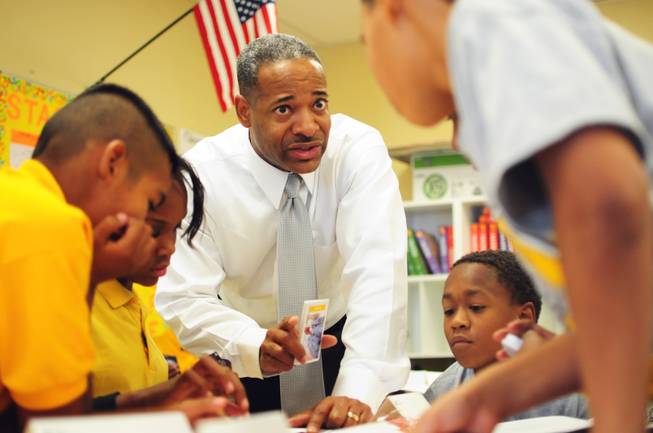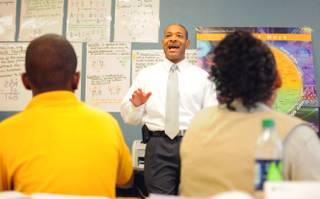
Junior Achievement volunteer Brian Pauling of NV Energy teaches financial literacy to students at Imagine 100 Academy of Excellence in North Las Vegas on Friday, Oct. 21, 2011.
Saturday, Oct. 22, 2011 | 1:03 p.m.
Brian Pauling paces in front of the classroom, his booming voice carrying a sense of urgency so acute, it’s palpable.
Sitting in front of him are about 30 sixth graders, some fidgeting but most entranced by the former accountant’s lesson on the importance of having good credit.
“If you have a great credit score, you can buy great things at a low cost,” he says, with a smile that quickly turns into a frown. “If you have a bad score, you’ll end up paying a lot for something cheap.”
The young students won’t be eligible for a credit card anytime soon, but it’s never too early to educate students about financial literacy, Pauling says after the lesson. He was among 20 volunteers from NV Energy teaching more than 550 students at the 100 Academy of Excellence Friday morning about how to build healthy financial habits.
It’s a practical skill that is important to understand now more than ever. Outside the walls of the North Las Vegas charter school lies the foreclosure and unemployment capital of the nation — ground zero for the worst recession in more than half a century.
In a city trying to reinvent itself, education is seen as the panacea that will help Las Vegas diversify its economy. For Pauling, teaching math, reading, science and history isn’t enough to begin the rebuilding process.
“Financial literacy is the key to spurring the economy,” he says. “Those kids who graduate high school, get to college and learn sound financial practices will have a lot more earning potential and opportunities.”
•••
That’s the goal of Junior Achievement of Southern Nevada, the local chapter of a national nonprofit established in 1919 to bring financial literacy training to school districts.
This year, the program is being taught in 37 schools, the majority elementary schools. By the end of the year, Junior Achievement hopes to visit 800 classrooms and help more than 20,000 students, said Junior Achievement Chief Operating Officer Jodi Manzella.
“When there’s a natural disaster, you call the Red Cross,” she said. “When there’s an economic crisis, we want people to call on Junior Achievement as a prevention method.”
More than 500 volunteers from some of Las Vegas’ major corporations will fan out across the district, armed with three hours of training and prepared lesson plans. Junior Achievement provides volunteers with an interactive, grade-appropriate program that teaches kindergarten students up to high school seniors about the key concepts in financial literacy, work readiness and entrepreneurship.
Kindergarten classes are taught the difference between wants and needs, and what it means to save. Each subsequent grade learns about local, state and national economies, taxes and trade and even how to write a resume.
These financial workshops — which meet Nevada state standards — aren’t dreary lectures on complicated economic subjects, Manzella said. Financial terms are taught using terms that students can easily understand. For example, a credit score is like a student’s grade point average, she said.
Further, hands-on activities such as card games are used to help schoolchildren relate to financial terminology such as gross and net income.
“The kids have so much fun, they don’t even realize what they’re learning,” Manzella said. “It’s invaluable as an avenue to inspire kids to reach their potential.”
•••
Pauling is reviewing an exercise with students about effective budgeting.
“Do you want to spend $150 on a pair of Air Jordan (sneakers), or would you rather spend $20 on a pair of Chuck Taylor (shoes) and spend the rest on something else?” Pauling asks a student.
The girl nods enthusiastically: “Chuck Taylors,” she says.
Pauling smiles. “Those are the opportunity costs, the consequences of the decisions we make,” he says.
The son of a schoolteacher recalls his childhood growing up in Chicago and Atlanta. Pauling’s father — a manager who rose through the ranks of the RJ Reynolds Tobacco Company — taught Pauling some of his first lessons in financial literacy and delayed gratification, he said.
Father and son paid household bills together, and waited a week to watch new movies on a discount, Pauling said.
Even though he learned a lot from his father, Pauling said he didn’t touch upon proper budgeting until late in high school. Formal lessons in personal finance didn’t come until he was a freshman accounting major in college, Pauling added.
“These kids (at 100 Academy) are really getting a head start,” he said.
•••
The Imagine 100 Academy of Excellence was founded in 2006 with the help of the 100 Black Men of Las Vegas, a nonprofit organization dedicated to solving challenges facing the black community. Pauling currently serves as the president of the organization, whose members mentor students — kindergarten through 8th grade — at the academy.
Although the school curriculum meets district standards, it does not include many lessons about financial literacy, said Principal Peggy Selma. With funding from the United Way of Southern Nevada, Junior Achievement was able to provide financial lessons to 100 Academy for the past two years.
“The lessons are so interactive, they’ll stay with the children,” Selma said. “They learn a lot by doing. If they get that awareness (of financial terms), I think it’ll pique that curiosity and hopefully make them do more research (into finance).”
That’s particularly important at 100 Academy, where the majority of students come from at-risk or minority backgrounds. More than 80 percent of students are black or Hispanic, and more than half receive free or reduced-price lunches.
“Parents are working so hard, doing double and triple shifts, just trying to make ends meet that they’re not focused on teaching (their children) financial responsibility,” Pauling said. “It’s not on their radar.”
While the Great Recession has affected most Americans, research has shown minorities have shouldered the brunt of the foreclosure crisis and pack the unemployment lines, Pauling said.
“When the economy takes a downturn, it hits African-Americans, Latinos and minorities more than any other group,” he said. “When there’s a recession, it’s a depression in the minority community. It’s critical for us that these kids have the education in finances so it breaks that cycle.”
•••
Pauling finishes his lesson with a primer on the difference between cash and credit.
“Credit cards can be a good thing and a bad thing,” he tells his students. “The most important thing about credit is making sure you have the money to pay the bill when the bill comes. Credibility is where honesty and consistency meet.”
Pauling looks around the classroom filled with students on the cusp of adolescence. In a few years, many of them will start working, dating and growing into young adults. Pauling wants to ensure these students have the knowledge to navigate these uncertain times.
Pauling thinks of his parents. His mother grew up without running water in her house. His father grew up with 12 siblings on a hog farm.
Both were able to become first generation college graduates, instilling in their children the importance of education, he said. Pauling’s brothers have gone on to prestigious law schools. Pauling is currently the director of Federal Energy Regulatory Commission compliance at NV Energy.
Pauling said he hopes the same successes for 100 Academy students. But to reach those same outcomes, he knows there is much work to do. He is reminded that district-wide, about half of the seniors are at risk of dropping out this year.
However, Pauling won’t be discouraged. He quotes a Bible verse: “To whom much is given, much is required.”
“A lot of people made sacrifices to help me get here,” he said. “I feel obligated. It’s my job to give back to these kids.”


Join the Discussion:
Check this out for a full explanation of our conversion to the LiveFyre commenting system and instructions on how to sign up for an account.
Full comments policy